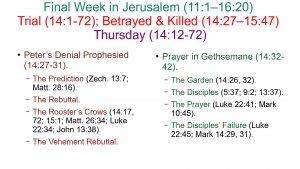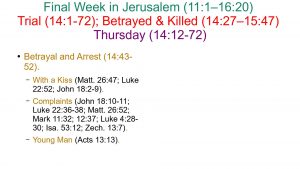Jesus’ Final Week in Jerusalem
Mark 11:1–16:20
Teaching (11:1–13:37)
King (11:1-11)
Sunday: Triumphal Entry (11:1-11).
Lawgiver (11:12–12:44)
Monday (11:12-19).
Tuesday (11:20–14:2).
Prophet (13:1-37)
Trial (14:1-72)
Sacrifice (14:1-26)
Wednesday (14:3-11).
Thursday (14:12-72)
The Passover (14:12-21).
The Last Supper (14:22-26).
Betrayed and Killed (14:27–15:47)
Peter’s Denial Prophesied (14:27-31).
Prayer in Gethsemane (14:32-42).
The Garden.
The Disciples.
The Prayer.
He went a little farther, Luke says a stone’s throw from the three (Luke 22:41), fell down and prayed.
It was within eyeshot, but barely within earshot depending on how loud you are speaking through this olive grove.
Jesus knew what He was about to endure—as we said a moment ago, He had let Himself be caught.
But that didn’t mean He wasn’t struggling with it.
Have you ever known you were about to face something you weren’t going to enjoy, but you knew it was necessary?
This is by far an understated comparison, but it’s kinda like ripping a band-aid off. In fact that’s almost become a phrase for us: “Just rip that band-aid off.”
The idea is that doing it all at once may hurt, but it won’t be as prolonged as taking it off slowly—and it’s gotta come off.
But just before doing it, you are dreading it despite knowing that it’s better in the long run.
Of course, dying on the cross is exponentially worse than ripping off a band-aid, but the concept is similar.
It’s better to take care of it now than prolonging the suffering, but that doesn’t mean He doesn’t want to do it.
His earthly flesh is warring with His sense of duty and purpose.
As Bro. Wayne Jones words it: “There is no doubt that Jesus was engaged [in] a spiritual battle wherein the internal conflict of the flesh seeking to avoid the extreme pain of the cross was in conflict with the mission of the Messiah to come and do the will of the Father. His prayer was an expression this battle and exhibited a strong desire to settle the matter once and for all” (Jones 154).
How many times have we talked about the purpose statements of Jesus, and the fact that He was meant to “give His life a ransom for many” (10:45).
This is the thematic verse of Mark’s gospel, and it is on display here. He knows what He has to do, but He is scared—can you blame Him?
 He calls out to “Abba, Father.”
He calls out to “Abba, Father.”The Hebrew word for “father” is ab, and the word Abba, is based on a Chaldean/Aramaic emphatic form of this.
I did some research awhile back wanting to know why the names for “mother” were so similar in unrelated languages all over the world and through time.
It’s because “m” is one of the first consonant sounds that we make as babies, so it’s very easy to teach your infant that.
The name for “father” isn’t quite as universal as one might expect, but there are a lot of similarities, “dad/dadda/daddy,” “pa/papa,” and even “ab/abi/abba.”
The “d,” “p,” and “b” are also among the first consonant sounds a baby makes along with the “m.”
The point is, Jesus is using a term of endearment for His Father that is reserved for the most intimate relationship between father and son—almost like us saying, “Daddy.”
It later became a normal means of addressing God in prayer.
It is automatically translated here for the reader as patēr, father.
All things are possible for God.
It is true that all things are possible for God, so why couldn’t He keep Jesus from sacrificing Himself and still save mankind?
While all things are possible for God, He still has a divine purpose.
He has an infinitely superior mind and purpose, and we must trust that this was the best plan for the salvation of mankind.
While all things are possible, not all things are expedient to carry out His plan and purpose.
Jesus knows all this, and so humbles Himself before the Father, putting His will beneath God’s in voluntary submission.
This ought to be our prayer as well: Father, hear my cry! Nevertheless, not my will, but Yours be done!
It ultimately boils down to trust for our heavenly Father that He knows what’s best, a trust that Jesus had in spades.
And yet His disciples were found wanting.
The Disciples’ Failure.
Have you ever known anyone who, the moment they sit still for any length of time, they fall asleep? Maybe that’s you.
I’ll be honest I’m a little jealous of such people, but we find here that this isn’t exactly a desirable trait for Jesus’ disciples.
Jesus is baring His soul to the Lord, asking His disciples to keep watch, and in His greatest hour of need they fail Him, allowing themselves to fall asleep.
This is the exact opposite of what He asked them to do (14:34), of what He urged them to do earlier (13:37).
It was certainly late at night, no doubt when they would normally be sleeping, but Luke adds that they were “sleeping from sorrow” (Luke 22:45). They were no doubt exhausted from all the talk and sadness of His imminent departure.
Instead of calling him Peter, Jesus calls him Simon, his original given name. He’s not being a very good rock right now, is he?
He urges them to watch and pray, and what follows is a somewhat confusing exhortation: “lest you enter into temptation.”
Temptation to do what? What sin might you do when you’re asleep?
Well, this might better be translated: “enter into trials/afflictions.”
So failing to watch and pray could lead one into further troubles in life, and particularly for this trio.
“The immediate need of the disciples is the strength to face the test of their faith and commitment to Jesus that will soon come with His arrest, trial, and death” (Stauffer 354).
And this last statement is so true of us all: “The spirit indeed is willing, but the flesh is weak.”
This ought not be used as an excuse to fall for temptation and sin or to fail at the tests and trials of life, but to account for our flesh in various ways.
After all the bluster Peter and the other disciples did just a few moments earlier, we see them fail miserably (14:29, 31).
The disciples were human beings, prone to certainly failures as we all are, particularly sleep—not that sleep is a failure per se, but in this instance they found it difficult to overcome their fatigue.
And certainly the more tired we are, the easier it is to fall into temptation and sin—our defenses aren’t as strong as they would be otherwise.
But just as we might build up a weak muscle through exercise, we should build up our flesh to withstand the trials that might afflict it.
As I said in a sermon a few weeks ago, if we don’t train ourselves, we might injure ourselves.
And then this weakness is not something they correct, for it happens two more times.
When one is groggy, it certainly is difficult to know how to answer anybody, so I certainly understand what the disciples are going through here.
And that’s the point, isn’t it? How many times has our flesh prevented us from doing something we so wanted to do?
In any event, we see the model of watching and praying in our Lord rather than in the disciples.
The last time Jesus comes back He chides them again and tells them that it’s time, Judas the Betrayer was coming with men to arrest Him and they were already near the entrance to the garden.
 Betrayal and Arrest (14:43-52).
Betrayal and Arrest (14:43-52).With a Kiss (14:43-46).
Imagine being the disciples here, seeing these men approach with swords and clubs.
It’s dark, so you can’t really see much, but you can hear the armor clanking, the glint of steel, and hostile faces in the light from the lanterns and torches.
No doubt your senses are heightened and your adrenaline is up.
Matthew and Mark only say that a great multitude had come from the chief priests, scribes and elders (Matt. 26:47).
Luke reveals that the chief priests, captains of the temple, and the elders were present as well (Luke 22:52), and John says there was a detachment of troops and officers from the chief priests and Pharisees (John 18:3).
No doubt the soldiers were carrying the swords while many of the others are wielding the clubs.
Judas had led them all to this familiar place.
Knowing this was a frightful sight, Judas approaches Jesus in a very friendly manner, apparently in an attempt to disarm Him and the other disciples.
“Rabbi, Rabbi,” he says, and kisses him.
This isn’t a lewd act in any way, but a kiss between good friends which was very common back then and even in certain cultures today.
It was especially common between teachers and their disciples.
This was an arrangement that Judas had with them beforehand, that whomever he kisses is Jesus.
Why do this? Why was Judas needed and why did he need to give this kind of signal? Well, first off, it’s going to be dark. Yes, they have lanterns and torches, but their light may not be able to help the soldiers distinguish between Jesus and the rest.
Only someone very familiar with Jesus would be able to identify Him reliably under these conditions.
John records that Jesus asks who they are looking for twice, they tell them both times, and both times He reveals Himself (John 18:4-9).
Complaints (14:47-50).
The first complaint was from one of the disciples, a sword to the face!
In other accounts, we know this was Peter who struck the ear of Malchus, a servant of the high priest (John 18:10).
The disciples had acquired two swords before this at Jesus’ insistence, as recorded in Luke 22:36-38.
I have heard many use this to support the concept of self-defense—not to comment on that issue specifically, but I don’t think this passage can or should be used for that purpose.
What other time would they have needed to defend themselves than this? And yet Jesus tells them to put the sword away (Matt. 26:52; John 18:11).
So why grab the swords? Jesus states that it is to fulfill prophecy, so He would be numbered with the transgressors (Luke 22:37).
Basically, they knew His people were “armed and dangerous,” so they would have an excuse to send the armed soldiers to nab Him at night.
Which leads into Jesus’ verbal complaint: Why take Me now, like you would a robber at night? I was with you in the daytime, making no attempts to hide Myself. Why not arrest Me then?
Of course, we established earlier why they took Him at night away from the crowds: because the crowds loved Him (Mark 11:32; 12:37).
Their cowardice and fear of the people made this nighttime nabbing necessary.
Therefore a traitor was necessary for the plan so they might catch Him at night when He’s away from the adoring crowds.
Jesus had escaped from murderous crowds before, but not this time (e.g. Luke 4:28-30), this time His time had come.
Scriptures would now be fulfilled, that He would die as a transgressor and that His disciples would flee (Isa. 53:12; Zech. 13:7).
But these 11 men are not the only ones to flee …
Young Man (14:51-52).

